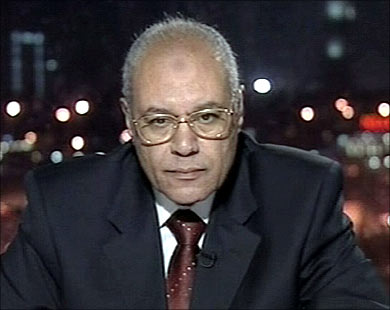 The sectarian hostilities which broke out last month in the wake of the war of words between Islamic and Coptic scholars had the resounding effect of alerting—and alarming—Egyptians to the deplorable quagmire the homeland is steadily sinking into where Islamic Coptic relations are concerned. The pile-up of disturbing sectarian incidents and bitterness has long been placed on hold on all levels—the official, religious, civic, and media—with nothing whatsoever done to remedy the explosive situation. When the bomb finally blows off, as in the case of the Nag Hammadi Christmas Eve crime in which six Copts—and a Muslim passer-by—were killed as they left church after Midnight Mass, a deluge of analyses, opinion, and declarations is released demanding action and reform.
The sectarian hostilities which broke out last month in the wake of the war of words between Islamic and Coptic scholars had the resounding effect of alerting—and alarming—Egyptians to the deplorable quagmire the homeland is steadily sinking into where Islamic Coptic relations are concerned. The pile-up of disturbing sectarian incidents and bitterness has long been placed on hold on all levels—the official, religious, civic, and media—with nothing whatsoever done to remedy the explosive situation. When the bomb finally blows off, as in the case of the Nag Hammadi Christmas Eve crime in which six Copts—and a Muslim passer-by—were killed as they left church after Midnight Mass, a deluge of analyses, opinion, and declarations is released demanding action and reform.
To rectify sectarianism
Youseef Sidhom
Opinion
00:10
Sunday ,24 October 2010

Months have passed since the Christmas Eve crime last January (Copts celebrate Christmas on 7 January), and no action has been taken in the direction of ameliorating the morbid climate that bred the Nag Hammadi crime, nor towards rectifying the sectarian situation. True, the suspects have been brought to court, but the trial is proceeding suspiciously slowly, too protracted for many to believe that justice will ultimately be fulfilled. The question which seriously begs an answer is whether the lack of firm action following the Nag Hammadi crime has led to the current sectarian crisis.
Last January, the National Council for Human Rights (NCHR) was foremost among the rights activists who condemned the Nag Hammadi crime, issuing a candid, bold declaration analysing the situation and calling for reform. Today, following the deteriorating sectarian situation, the Journalists’ Syndicate has issued a declaration equally candid and bold. The declaration was the fruit of a conference convened in Cairo under the theme of confronting sectarian sedition; the participants included not only journalists but also a large number of intellectuals, political figures, civil society activists, and figures from the religious establishment. There was a wide expression of concern regarding the threat sectarian conflict poses against the integrity, unity and peace of the Egyptian nation. Sectarianism, the participants said, is a perilous phenomenon that is being fed and agitated by a media frenzy for sensationalism. “Silence—meaning non-action—is no longer an option,” they stressed.
Just as I appreciated the NCHR declaration earlier this year, reviewing it at the time and later expressing concern that it was totally disregarded by the State apparatuses concerned, I today review the declaration issued by the Journalists’ Syndicate convention. I sincerely hope that this time the apparatuses concerned should take the declaration seriously, and that we should see tangible reform on the sectarian front.
The resolutions issued by the convention are to the following effect:
• The State is required to fortify the basis for political change and endorse the State of law and order by securing full citizenship rights for all Egyptians. The citizenship rights cited in the Constitution should translate into laws and regulations based upon human rights codes and treaties.
• A law should be enacted to penalise religious, ethnic, or creed-based discrimination. Victims of discrimination should be indemnified.
• Measures should be taken to halt religious or ethnic-based discrimination in appointment to public office. The system of election to legislative councils should guarantee suitable representation of all sectors of Egyptians.
• A unified law for building places of worship should be issued. The 1934 “Ten Conditions” for building churches should be annulled. Church building and restoration should be governed by clear rules and regulations that fulfil the needs of congregations.
• A law should be issued to criminalise sectarian address in the press, the media, educational institutions, mosques and churches.
• School texts on the Islamic and Christian religions should be revised with a view to upholding tolerance and common values.
• The religious box in ID cards should be abolished.
• In case of sectarian crimes, the law should be strictly implemented; traditional reconciliation sessions may be held to calm down matters but only in parallel to legal measures not as a substitution.
• Religious institutions should not confiscate a citizen’s right to practice politics through political parties and movements. They should also refrain from debates on different creeds and beliefs.
• The right to freedom of belief should be respected. Citizens should be able to choose, free of any pressure, which religion or sect to belong to.
• The press and the media are required to meticulously tackle all printed or broadcast material in a spirit supportive of national unity and citizenship rights. Editors-in-chief are to be held fully responsible for that.
• Public inter-religious debates which debate the veracity of different creeds should be banned, as should reporting on them in the media and the press.
• The Journalists’ Syndicate is required to monitor violations to the code of journalistic honour and penalise violators.
• The Supreme Press council is required to include a special section on respect for national unity in its annual report. Papers which instigate sectarian sedition should be reprimanded.
• The Investment Authority should take legal action concerning satellite channels which engage in inter-religious debate or ridicule specific religious creeds.



